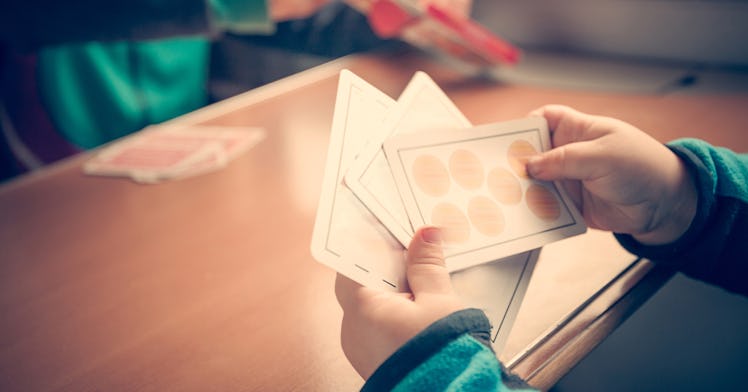Teaching Kids to Play Poker And Other Card Games
Phil Hellmuth would like your kids to join his at the high stakes table.

For more advice on fun stuff to do with your kids, from ridiculously overqualified experts, check out the rest of our 940 Saturdays.
Skill at playing cards is a gift that keeps on giving from playroom go fish to nursing home bridge, and the zenith of this lifelong hobby is the poker phase, when winning means taking cash off your buddies and losing means you just spent a few hours hanging out with your buddies. If you want to save your kid a spot at your weekly poker night sooner than later, teach them the way Phil Hellmuth taught his sons — they’re now 22 and 24-years-old, and they happily pass on free backstage passes to Nelly shows so they can join $110 buy-in tables (true story).
RELATED: The Best Card Games for Kids
With 14 World Series Of Poker bracelets, Hellmuth is the winningest competitive poker player on the World Series circuit, but his sons were outlasting him at the high stakes table by the time they hit college. Between that and his annual Hellmuth Family Poker Tournament, this guy knows how to raise kick-ass poker players.
Teach Kids Discretion With Go Fish, War And Other Simple Card Games
Hellumuth’s boys knew that a flush beats a straight by age 5, but you should set that bar a smidgen lower for kids who didn’t credit their Disneyland trips to Daddy’s ace on the river. Think go fish and war — games of chance that level the playing field between child and man, transforming young winners into card lovers. And go fish lets you teach valuable lessons about tipping after you methodically strip them of every clearly visible card in their hand.
Teach Odds And Strategy With Hearts And Spades
“My kids right away became really excellent hearts players,” Hellmuth says. “Hearts is a very complex game, where you have to count the suits that are out.” Hearts and spades are easily learned by kids and condition them to play strategically by determining how many remain of each suit. It looks simple at first but gets more complicated with time, like trying to define the word “the.”
Another important poker lesson from hearts and spades: observing the opponent’s actions in order to counter their strategy in real time. For example, if a hearts player tries to “shoot the moon,” opponents have to shift from avoiding points to chasing points in order to counter the moon shooter.
Teach The Basics And Bluffing With Draw And Stud Poker
When your hearts-loving-champ-in-the-making is ready to up the ante to something with an ante, start with a 5-card stud or draw poker game so they can learn all the hands and how the rounds of betting work.
If you don’t want to turn them into actual gamblers just yet, play with candy or nuts or something else they’ll legitimately fear losing. Otherwise, they’ll never learn how to bluff, because bluffing isn’t bluffing if you’re not hiding anxiety (at that point, it’s more properly called “f—ing with the other guy”).
MORE: ‘Story Cards’ Help Kids Spin the Silliest Bedtime Tales
From there, it’s all about the poker face, and your kid doesn’t have to know how to impersonate a brick wall to have a good one — Hellmuth bluffs all the time with a smile on his face: “If you feel like someone’s reading you, start talking, and smile.” he advises. “If you can look at someone and smile, it’s very hard for them to read you somehow.”
Teach Reading Faces And Body Language With Texas Hold’em
“I tell my kids, poker is all about patience, and it’s all about reading people — understanding their motivations in life,” says Hellmuth.
In his book, Play Poker Like The Pros, he explains that most poker players can be described by one of 4 animals: the jackal is crazy and unpredictable, the elephant plays too many hands, the mouse plays too conservatively, and the lion is the most skilled. Once you can identify these traits in your competitors, you can understand what makes them tick, which makes them easier to read. Depending on your kid’s age when you’re explaining this, maybe use hand puppets as props.
If your kid can perfect reading the table, what Phil famously calls “white magic,” they can master poker and, if you’re lucky, they’ll prefer a friendly game of cards to drunken clubbing when they get older. If you’re unlucky, your kid will like a friendly game of cards so much they drop out of college and play professionally, like Hellmuth did (much to the disapproval of his father Phil Hellmuth Sr. M.B.A.,J.D., Ph.D, and former dean of the University of Wisconsin — seriously).
So don’t be too good of a teacher. As Hellmuth warned his kids, “Poker’s not necessarily an easy way to make a living.”
This article was originally published on